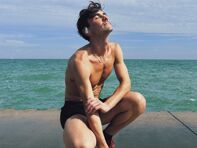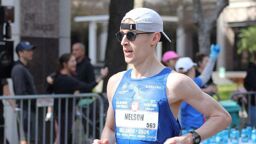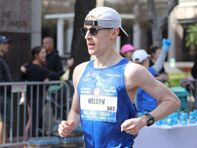Growing up, sports were my everything.
As a kid in New Hampshire, I was fortunate that my parents signed me up for a plethora of different leagues, and I was quick to find my purpose out on the soccer field. I could always find solace in the hours spent at practice, my mind at ease after hours of cardio, shooting, and running drills with my teammates. The soccer field was a place where I could escape reality and block out the noise; a break from the voices in my head, telling me that it wasn’t OK to love differently.
Physically and metaphorically, I felt as if I was always running. The miles I would pound out on the track or the soccer field served as an attempt to distance myself from who I was destined to be; who I was terrified to be.
I began to feel the walls that were my identity closing in on me, yet I persisted. I wanted, more than anything, to fit in, even if it meant hiding one of the most beautiful parts of myself. I sought isolation in order to best mask the innate fear that who I was would never be accepted, immersing myself in sport.
Part of me believed that it would fill the gaping hole in my heart; as if it would somehow compensate for the part I wasn’t sure how to process. Ultimately, I turned to running as an escape, deciding to leave the world of soccer behind.
From the moment I set foot on a cross-country course at 15, I knew running was home. I romanticized every little aspect of the sport; the crisp fall mornings when I’d sit to eat my oatmeal, watching the dewdrops glisten in the warm light as the sun rose over the orange-tinged trees.

Stepping off the school bus onto the grassy race course, mud-stained trainers laced tightly for the warm-up. I loved the camaraderie and breathless laughter as I joked with my teammates through the course walk, fighting off nerves and worries about the grueling 3.1 miles that awaited us.
I loved the adrenaline rush I’d feel through the first half-mile, jostling for position in the sea of blue, green, red and yellow singlets. And that indescribable, out-of-body experience that was the final 200 meters, using every ounce of strength I could muster to get myself across the finish line.
For the first time in my life, I had found a glimmer of the freedom I so desperately sought after. The rush of adrenaline. The runner’s high. When I laced up my spikes and the starting gun sounded, nothing else mattered. Running empowered me. Running made me feel, even for a second, like I could do anything; like I could be anything.
The feeling was fleeting, as the toughest mental battle I faced resumed the moment I crossed the finish line; because no matter how fast I ran, I couldn’t outrun the deep-seated fear rooted in my conscience. It always followed me, chasing me mile after mile. I kept my head down, and I worked harder. To be faster. To escape. My frustration was channeled into a meticulously curated routine, plagued by an emerging eating disorder.
By the end of my sophomore year, I had planned my life to a T — and by November of my senior year I had committed to further my athletic endeavors at a Division I level.
I couldn’t see any other option; I had tied my sport so closely to my identity for as long as I could remember, and couldn’t fathom living life without it. I didn’t want to; because as much as it was my safe space, it had also become a metaphor for how I felt in my day-to-day life. I didn’t know who I was without running. I had become dependent on it. The relationship between my sport and my identity had begun to weigh greatly on my mental health, and something had to give.
As I rounded out my senior year, the relationship between running and I continued to crumble. By the time July rolled around, I was face-to-face with the undeniable truth that I was no longer running for myself, but from myself.
I had reached a dead end, and had nowhere left to turn. For the sake of my health, both physically and emotionally, I knew I had to let running go. It felt like the worst breakup of my life. The very thing that I had dreamed of for years was pulled out from under me, right as I neared the starting line of my next chapter. But in that sadness, I was offered the promise that I’d one day redefine what it meant to me. I could rekindle the passion that once burned so fiercely within.
Sports had been my safe space from the moment I could walk, and were far too sacred to me to be tarnished by the fear and anguish I had bottled up over the years. So, upon recovering from my eating disorder, I came out.
I came out to a few of my closest friends first, and they were so wonderfully supportive and happy for me. A lot of them told me that they knew, and that it made them happy to see me so proud and confident.
When I came out to my family and the rest of my friends, I actually did it through a video on TikTok. I came out to my sister using a sound on the platform and shared it on my account. I got an outpouring of love and support from my family and friends, which felt like such a huge weight off of my shoulders. It was the best feeling in the world, realizing that no matter what, the important people in my life were always going to love me. It is special to know that who I am, and always have been, was always enough, and I want other young people to know that, too.
I wanted my sport to become an extension of who I really was, and everything I stood for. I wanted to make the little girl who found herself through sport proud. I wanted her to know that there was a place for her, too; where she could love as freely and openly as she’d so choose. I wanted to help all humans and all bodies feel like they had a place in sport; because I knew how much I needed that when I was young.
Coming out gave me the freedom I’d yearned for; the feeling, once fleeting, now instilled within me, proudly. It allowed me to really come into my own, confidently, as a lesbian. It allowed me to fall in love, the way I’d only ever seen in movies.
It was love that I felt with every fiber of my being; the kind of love that felt like butterflies, fluttering leaves and watercolors swirling around every time I looked at her. Love that I’d always known was out there, that I finally felt like I deserved.

Upon meeting my partner, Susie Poore, (herself a runner), we decided to reclaim the sport that had shaped us, together. We made each other stronger, and returned to running as the proudest, happiest and healthiest versions of ourselves.
Together, we redefined what movement meant to us, and reclaimed the sport that was, for so many years, our only sense of belonging. Only now, we were doing so as a celebration of who we’d each grown to become, and who we’d continue to grow to be, in partnership.
Ultimately, I grew to realize that being an athlete could always be part of my identity, but it could also be a medium by which I could celebrate in every sense of the word.
Reclaiming sport was one of the most empowering and pivotal moments in my life, and having the opportunity to do so alongside the person that makes me the most me I have ever been is something I wouldn’t trade for the world.
Kenzi Hayden, 20, competed in cross country and track at Souhegan High School in Amherst, New Hampshire. She was committed to college but ultimately took a back seat on running in order to focus on her mental health, and now advocates for eating disorder recovery and health at Every Size, particularly in sport. She is pursuing a Bachelor’s degree in Communications online through Arizona State University. She can be reached via Instagram at www.instagram.com/kenzhayd and www.instagram.com/kenziesrrecovery or via email at [email protected].
Story editor: Jim Buzinski
If you are an out LGBTQ person in sports and want to tell your story, email Jim ([email protected])
Check out our archive of coming out stories.
If you’re an LGBTQ person in sports looking to connect with others in the community, head over to GO! Space to meet and interact with other LGBTQ athletes, or to Equality Coaching Alliance to find other coaches, administrators and other non-athletes in sports.





































